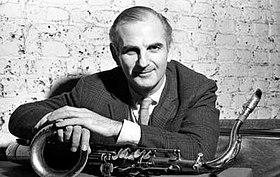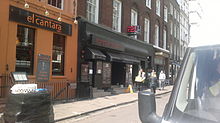Ronnie Scott
Ronnie Scott | |
|---|---|
 | |
| Background information | |
| Birth name | Ronald Schatt |
| Born | 28 January 1927 Aldgate,London,England |
| Died | 23 December 1996(aged 69) London, England |
| Genres | Jazz |
| Instrument(s) | Tenor saxophone |
Ronnie ScottOBE(bornRonald Schatt;28 January 1927 – 23 December 1996) was a Britishjazztenor saxophonistandjazz clubowner.[1]He co-foundedRonnie Scott's Jazz Clubin London'sSohodistrict, one of the world's most popular jazz clubs, in 1959.
Life and career
[edit]
Ronnie Scott was born inAldgate,East London,into a Jewish family.[2][3]His father, Joseph Schatt, was of Russian ancestry, and his mother Sylvia's family attended the Portuguese synagogue in Alie Street.[4][5][6]Scott attended theCentral Foundation Boys' School.[7]
Scott began playing in small jazz clubs at the age of 16. His claim to fame was that he was taught to play by "Vera Lynn's father-in-law! ".[citation needed]He toured with trumpeterJohnny Claesfrom 1944 to 1945 and withTed Heathin 1946.[1]That same year, he appeared as one of the band members inGeorge in Civvy Street.He worked withAmbrose,Cab Kaye,andTito Burns.He was involved in the short-lived musicians' co-operative Club Eleven band and club (1948–50) withJohnny Dankworth.Scott became an acquaintance of the arranger/composerTadd Dameron,when the American was working in the UK for Heath, and is reported to have performed with Dameron as the pianist, at one Club Eleven gig.[8]
Scott was a member of the generation of British musicians who worked on the Cunard linerQueen Maryintermittently from 1946 to around 1950. The ship would sail to New York City where they were exposed toBebop,the new form of jazz being played in the clubs there.[1]Scott was among the earliest British musicians to have been influenced byCharlie Parkerand other players of modern jazz.
In 1952, Scott joinedJack Parnell's orchestra and from 1953 to 1956 led a nine-piece band and quintet which includedPete King,with whom he later opened his jazz club,Victor Feldman,Hank Shaw,andPhil Seamen.He co-led The Jazz Couriers withTubby Hayesfrom 1957 to 1959 and was leader of a quartet that includedStan Tracey(1960–67).[1]
From 1967 to 1969, Scott was a member of theKenny Clarke/Francy Boland Big Band,[1]which toured Europe and includedJohnny GriffinandEddie "Lockjaw" Davis.Simultaneously he ran his octet, which includedJohn SurmanandKenny Wheeler,and a trio withMike Carron keyboards and Bobby Gien on drums (1971–1975). Scott's other bands often includedJohn Critchinsonon keyboards andMartin Drewon drums. He did occasional session work, which included performing the solo on "Lady Madonna",the 1968 single bythe Beatles,playing onRoy Budd's score for the filmFear Is the Key(1972), and performing the tenor sax solo on "I Missed Again",the 1981 single byPhil Collins.
In the1981 New Year Honours,Scott was appointed anOfficer of the Order of the British Empire(OBE) for services to jazz music.[9]
Charles Mingussaid of him in 1961, "Of the white boys, Ronnie Scott gets closer to the negro blues feeling, the wayZoot Simsdoes. "[10]Scott recorded infrequently during the last few decades of his career. He suffered from depression. While recovering from surgery for tooth implants, he died at the age of 69 from an accidental overdose ofbarbiturateprescribed by his dentist. The Westminster coroner's inquest in February 1997 recorded a verdict of 'death by misadventure'.
Ronnie Scott's widow, Mary Scott, and her daughter, Rebecca Scott, wrote the memoirA Fine Kind of Madness: Ronnie Scott Remembered,with a foreword bySpike Milligan.The book was published in 1999 in London byHeadline Book Publishing.
Ronnie Scott's Jazz Club
[edit]
Scott is perhaps best remembered for co-founding, with former tenor sax playerPete King,Ronnie Scott's Jazz Club,which opened on 30 October 1959 in a basement at 39Gerrard StreetinLondon'sSohodistrict, with the debut of a young alto sax player namedPeter King(no relation), before later moving to a larger venue nearby at 47Frith Streetin 1965.[11]The original venue continued in operation as the "Old Place" until the lease ran out in 1967, and was used for performances by the up-and-coming generation of domestic musicians.[12]
Scott regularly acted as the club's genialmaster of ceremonies,and was noted for his repertoire of jokes, asides and one-liners. A typical introduction might go: "Our next guest is one of the finest musicians in the country. In the city, he's crap". Another memorable announcement was: "Next week we're proud to have a quartet featuringStan Getzand violinistStuff Smith.It's called the 'Getz-Stuffed quartet'. "[citation needed]Ronnie often used in later days the services of John Schatt to book rock bands for Ronnie Scott's upstairs.
After Scott's death, King continued to run the club for a further nine years, before selling the club to theatre impresarioSally Greenein June 2005.
In September 2013, while the club was being redecorated, a 12-metre-square (39 ft2) hoarding was placed on the Frith Street façade as a tribute to its eponymous founder, bearing a giant photograph of Ronnie Scott byVal Wilmer,alongside one of his one-liners: "I love this place, it's just like home, filthy and full of strangers."[13]
Selected band line-ups
[edit]As well as participating in name orchestras, Scott led or co-led numerous bands featuring some of Britain's most prominent jazz musicians of the day.
- Alan Dean's Beboppers
- 1949
- Ronnie Scott (tenor sax),Johnny Dankworth(alto sax),Hank Shaw(trumpet), Tommy Pollard (piano),Pete Chilver(guitar), Joe Muddel (double bass), Laurie Morgan (drums), Alan Dean (vocal)
- Ronnie Scott Orchestra
- – 1954, 1955
- Ronnie Scott (tenor sax),Derek Humble(alto sax),Pete King(tenor sax),Hank Shaw(trumpet), Ken Wray (trombone),Benny Green(baritone sax),Victor Feldman(piano),Lennie Bush(double bass),Phil Seamen(drums)
- Ronnie Scott Quintet
- – 1955
- Ronnie Scott (tenor sax), Hank Shaw (trumpet), Victor Feldman (piano), Sammy Stokes (double bass), Lennie Bush (double bass), Phil Seamen (drums)
- Ronnie Scott Big Band
- – 1955
- Ronnie Scott, Pete King (tenor sax);Joe Harriott,Doug Robinson (alto sax); Benny Green (baritone sax); Stan Palmer, Hank Shaw, Dave Usden, Jimmy Watson (trumpet); Jack Botterill, Robin Kaye, Mac Minshull, Ken Wray (trombone); Norman Stenfalt (piano); Eric Peter (double bass); Phil Seamen (drums)
- The Jazz Couriers
On 7 April 1957, The Jazz Couriers, co-led byTubby Hayesand Ronnie Scott, debuted at the newFlamingo ClubinWardour Street,Soho. The group lasted until 30 August 1959.
- Ronnie Scott (tenor sax), Tubby Hayes (tenor sax, vibraphone), Terry Shannon (piano),Phil Bates(double bass),Bill Eyden(drums)
- Ronnie Scott Quartet
- 1964
- Ronnie Scott (tenor sax),Stan Tracey(piano),Malcolm Cecil(double bass), Jackie Dougan (drums)
- Ronnie Scott Trio
- 1970
- Ronnie Scott (tenor sax),Mike Carr(keyboards, vibraphone),Tony Crombie(drums, piano)
- Ronnie Scott Quintet
- 1990
- Ronnie Scott (tenor sax), Dick Pearce (trumpet),John Critchinson(piano),Ron Mathewson(double bass),Martin Drew(drums)
Discography
[edit]As leader
[edit]- Boppin' at Esquire(Esquire, 1948)[10 "]
- The Couriers of Jazz!(Carlton, 1958)
- The Night Is Scott and You're So Swingable(1965, Redial)
- When I Want Your Opinion, I'll Give it to You(Jazz House, 1965)
- Live at Ronnie Scott's(Columbia, 1969)
- ‘’The Pablo All-Stars Jam’’ (Pablo, 1977)
- Serious Gold(Pye, 1977)
- Never Pat a Burning Dog(Jazz House, 1990)
- If I Want Your Opinion(Jazz House, 1997)
- The Night Has a Thousand Eyes(Jazz House, 1997)
- Boppin' at Esquire(Indigo, 2000)
- Ronnie Scott Live at the Jazz Club(Time Music, 2002)
As sideman
[edit]With theKenny Clarke/Francy Boland Big Band
- Handle with Care(Atlantic, 1963)
- Now Hear Our Meanin'(Columbia, 1965) – rec. 1963
- Sax No End(SABA, 1967)
- Out of the Folk Bag(Columbia, 1967)
- 17 Men and Their Music(Campi, 1967)
- All Smiles(MPS,1968)
- Faces(MPS, 1969)
- Latin Kaleidoscope(MPS, 1968)
- Fellini 712(MPS, 1969)
- All Blues(MPS, 1969)
- More Smiles(MPS, 1969)
- Clarke Boland Big Band en Concert avec Europe 1(Tréma, 1992) – rec. 1969
- Off Limits(Polydor, 1970)
- November Girl(Black Lion, 1975) – rec. 1970. also withCarmen McRae.
- Change of Scenes(Verve, 1971) – also withStan Getz
With others
- Victor Feldman,Suite Sixteen(Contemporary,1958) – rec. 1955
- Phil Collins,Face Value(Virgin,1981) Tenor saxophone solo on "I Missed Again"
- The Beatles, "Lady Madonna"(1968) tenor saxophone solo
- Mark Murphy,Midnight Mood(MPS, 1968)
See also
[edit]References
[edit]- ^abcdeColin Larkin,ed. (1997).The Virgin Encyclopedia of Popular Music(Concise ed.).Virgin Books.p. 1062.ISBN1-85227-745-9.
- ^"Ronnie Scott, jazz's coolest Jew".The Jewish Chronicle.3 July 2009 – via PressReader.
- ^"A Fine Kind of Madness – Ronnie Scott Remembered".Eastlondonhistory.com.
- ^"Ronnie Scott".Everything2.com.
- ^"Ronnie Scott: 1927-1996".Jazzhouse.org.Retrieved25 March2019.
- ^"JCR-UK - Alie Street Synagogue (Federation) - closed, Aldgate, London E1".Jewishgen.org.Retrieved25 March2019.
- ^"Alumni".Central Foundation Boys' School. 2013.Retrieved8 October2015.
- ^Combs, Paul (2012).Dameronia: The Life and Music of Tadd Dameron.Ann Arbor, MI: The University of Michigan Press. p. 102.ISBN978-0472114139.
- ^United Kingdom list:"No. 48467".The London Gazette(Supplement). 31 December 1980. p. 12.
- ^"Ronnie Scott", Brian Priestley, in Carret al.
- ^Robert Sandall, "Ronnie Scott's says goodbye sticky carpets – hello decent food and air conditioning",The Daily Telegraph,24 June 2006.
- ^"47 Frith Street".Archived fromthe originalon 5 May 2012.Retrieved18 August2013.
- ^"Ronnie Scott's tribute to founder",The Daily Telegraph,28 August 2013.
Bibliography
[edit]- Clarke, Donald (ed.),The Penguin Encyclopedia of Popular Music,Viking, 1989.
- Kernfeld, Barry Dean (ed.),The New Grove Dictionary of Jazz,Macmillan Press, 1988.
- Kington, Miles;Gelly, Dave,The Giants of Jazz,Schirmer Books, 1986.
- Larkin, Colin,The Encyclopedia of Popular Music,3rd edition, Macmillan, 1998.
- Ruppli, Michel; Novitsky, Ed,The Mercury Labels. A discography,Vol. V., Record and Artist Indexes, Greenwood Press, 1993.
- Ronnie Scott withMike Hennessey,Some of My Best Friends are Blues(autobiography). London:Northway Books,2002.ISBN978-0-9550908-3-7
- Ronnie Scott's Jazz Farragocompilation of best features fromJazz at Ronnie Scott′s magazine, Hampstead Press, 2008,ISBN978-0-9557628-0-2
- Ian Carr, Digby Fairweather & Brian Priestley,Jazz: The Rough Guide.ISBN1-85828-528-3
- Richard Cook & Brian Morton,The Penguin Guide to Jazz on CD6th edition.ISBN0-14-051521-6
External links
[edit]- Ronnie Scott– biography by Jason Ankeny for Allmusic
- Ronnie Scott discography
- Pete King obituary,Daily Telegraph,21 December 2009.
- Portraits of Ronnie Scottat theNational Portrait Gallery, London
- 1927 births
- 1996 deaths
- 20th-century English musicians
- 20th-century saxophonists
- Accidental deaths in England
- Barbiturates-related deaths
- Bebop saxophonists
- Drug-related deaths in England
- English jazz tenor saxophonists
- English people of Russian-Jewish descent
- English session musicians
- Golders Green Crematorium
- Jewish English musicians
- Officers of the Order of the British Empire
- People educated at Central Foundation Boys' School
- People from Aldgate
- Post-bop saxophonists
- Kenny Clarke/Francy Boland Big Band members
